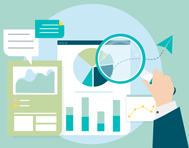6 Careers That You Can Pursue with an Economics Degree

If you’re looking to secure a good line of work but not sure what career to pursue, then getting a degree with a lot of flexibility would be best. To that end, economics is one such degree that offers a lot to people who are transitioning into the work force.
For one, economics is crucial in understanding how the world works and operates. In short, it helps people—particularly those in leadership positions—make the best decisions in order to achieve their goals. What’s more, many of the skills you will learn in economics are highly transferable. Thus, you can easily find jobs in almost any industry.
Fortunately, economics subjects and courses are taught in many schools in Singapore. As a junior college student, it’s also easy to find an economics tuition Singapore centre that can help you prepare for a stable, lucrative career in a variety of fields. Some of them include the following:
Economist
Being an economist primarily involves economic data research and analytics, studying economic trends and issues that can affect the production, consumption and distribution of resources. This is particularly important for businesses, so that they can adjust their strategies based on concrete data.
Do note that there are many industries where economists can lend their expertise. For example, a labour economist studies labour market trends, including unemployment rates and economic development. They then provide valuable advice to government agencies, corporations and similar organisations so that they can develop sound strategies. Meanwhile, a health economist works with healthcare professionals to help improve production and efficiency, thereby minimising disparities and delivering better health services overall.
Other industries that need the services of an economist include finance and insurance, scientific research, management, technology, as well as retail and marketing.
Accounting
An accountant’s primary role is to track a company’s finances, ensuring that every record is accurate. They also classify and interpret financial data, in order to present a clear picture of an organisation’s or an individual’s financial situation.
Keep in mind that you will need further qualifications to become an accountant. That being said, a background in economics is definitely valuable. In particular, a proficiency in maths and data analytics can come in handy in identifying issues in a company’s finances. There are also specialised paths you can take as an accountant with a background in economics, including tax accounting, managerial accounting, and even forensic accounting.
Analyst Roles
Another career path you can take with an economics degree is becoming a financial analyst. Their key role is to provide guidance for both businesses and individuals in making informed decisions that lead to better profits. They primarily analyse the performance of a variety of investments, including stocks and bonds, as well as help assess financial risks so that a proper strategy may be developed.
If you’d rather be in a different analyst role, you may also consider becoming the following:
- Credit analyst, someone who specialises in credit and loan applications
- Insurance analyst, someone who evaluates policies and determines corresponding risks for the insurer and the insured
- Data analyst, someone who identifies crucial trends and derives insights from a wide range of data, so that leaders can make better decisions regarding their business
There are also plenty of analyst roles in the government, especially in economics, trade, and finance.
Actuary
An actuarial professional makes use of statistical skills, financial theories, and economics know-how in order to determine the financial impact of different risks that may occur within a certain industry. It’s essentially risk management, but focused on financial security.
For example, an actuary for an insurance provider analyses how much it will cost the company should a certain number of policyholders die or become permanently disabled during a global pandemic. Armed with the correct information, the insurance company can then make the right decisions so that they don’t lose money while still being able to compensate their clients.
There are two categories of actuarial disciplines: life and non-life. The former deals with insurance, healthcare, and long-term care, among others, while the latter primarily deals with various types of liability insurance. Other fields for non-life actuaries include banking, investment, and marketing.
Business Consultant
One of the most viable career paths for someone with an economics degree is business consulting. In this field, you’re going to provide advice to clients so that they can improve their processes, financial management, and even human resource development. Many business consultants also conduct research, and often take an active role in developing business plans and executing strategies for their clients.
What’s great about being a business consultant is that you can take the freelance route. By working with multiple clients, you can potentially earn more.
Government Employee
Last but certainly not least, your economics degree will always be in-demand in the public sector. In particular, your expertise will be valuable in developing economic policies. You may also be hired to perform advisory or planning roles related to social welfare, risk analysis, taxation, pricing, and government spending.
If you’re not interested in the above, there are also options for you in sales, human resources, journalism, information technology, or even law. You may even put up your own small business, if you want and have the means to do so. All in all, there’s no shortage of career possibilities for economics students.











